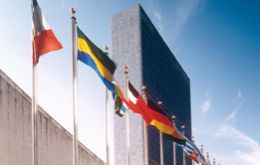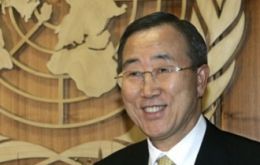MercoPress. South Atlantic News Agency
International
-
Thursday, March 13th 2008 - 21:00 UTC
A dolphin saves two stranded whales in New Zealand beach

A dolphin has come to the rescue of two whales which had become stranded on a beach in New Zealand. Conservation officer Malcolm Smith told the BBC that he and a group of other people had tried in vain for an hour and a half to get the whales to sea.
-
Thursday, March 13th 2008 - 21:00 UTC
Oil and Euro deny the Central bankers' revival plan a chance

Oil prices which reached 110.20 US dollars a barrel and the Euro which hit a new record high of 1.55 US dollars seem to have reduced the central banks concerted effort to a mere one day good intention.
-
Thursday, March 13th 2008 - 21:00 UTC
London the best city but also the most expensive & dirtiest

London was voted the best European city to visit by international travelers in a TripAdvisor survey, despite also being voted the most expensive and dirtiest. In a poll of 1,100 travelers worldwide, London retained its place as the number one city in Europe for nightlife and was also voted the best in Europe for public parks.
-
Thursday, March 13th 2008 - 21:00 UTC
UK legally obliged to send UN annual reports on Gibraltar

United Kingdom is legally obliged to continue to send annual reports on Gibraltar until the UN General Assembly votes to remove the territory from its list of non self-governing territories, even if the UK believes that a territory has been decolonized.
-
Thursday, March 13th 2008 - 21:00 UTC
Greek cruise vessel runs aground: 280 pax rescued

An investigation is underway after 280 foreign tourists had to be rescued on Thursday when their cruise ship ran aground in the Aegean Sea, Greek officials said.
-
Thursday, March 13th 2008 - 21:00 UTC
“Russia has no territorial claims over Antarctica”

A Russian first deputy prime minister said this week that Russia has no territorial claims to Antarctica, and will strictly abide by an international convention on the continent, reports Novosti agency.
-
Wednesday, March 12th 2008 - 21:00 UTC
UK battered again as storms return

Areas of Britain that escaped the worst of the storms earlier this week woke up to a battering on Wednesday.
-
Wednesday, March 12th 2008 - 21:00 UTC
New constitution makes Gibraltar/UK relation not colonial
Gibraltar Chief Minister Peter Caruana told the UK House of Commons Foreign Affairs Committee that he believes that the New Constitution provides for a relationship between Gibraltar and the United Kingdom which is not colonial in nature.
-
Tuesday, March 11th 2008 - 21:00 UTC
Subtle message from strong Euro Trichet to Federal Reserve
European Central Bank President Jean Claude Trichet said he's “concerned” about the Euro appreciation after the currency kept hovering on record rates against the US dollar. It's the first time Trichet has specifically expressed worry about the Euro vis-ÃÂ -vis other currencies since November.
-
Tuesday, March 11th 2008 - 21:00 UTC
Ban Ki-moon praises success of Rio Group summit

Secretary-General Ban Ki-moon applauded on Monday the outcome of this weekend's Rio Group Summit, which ended with the further resolution of tensions between Colombia and Ecuador.
